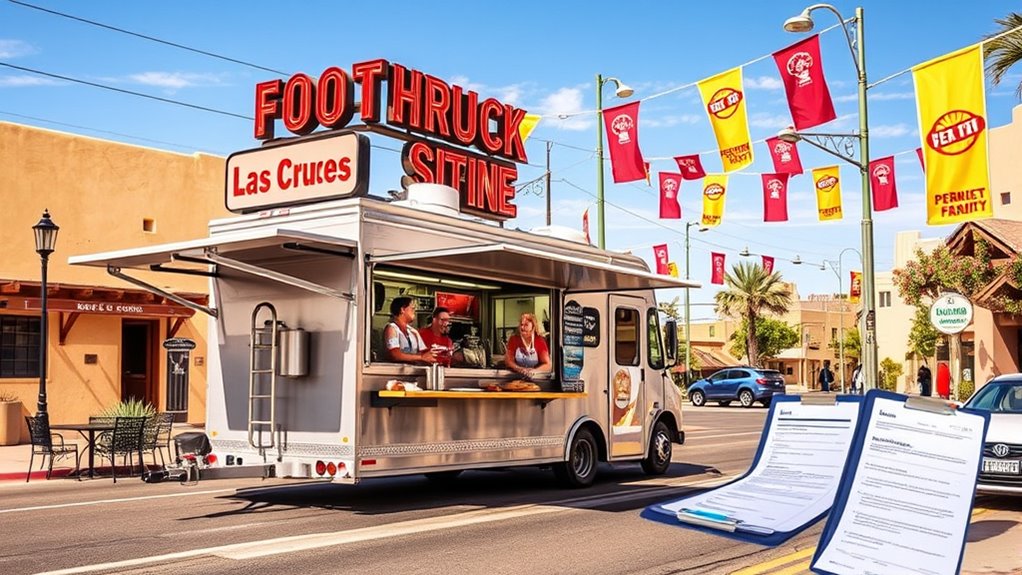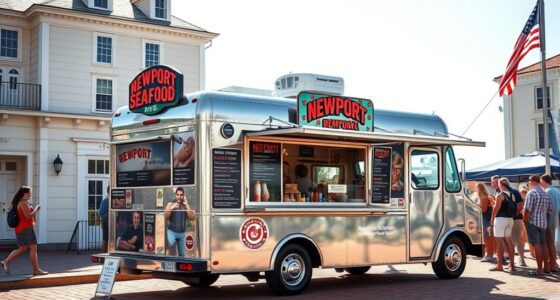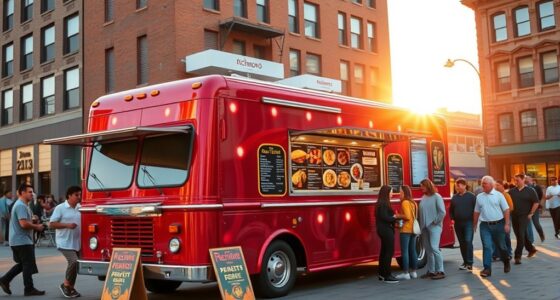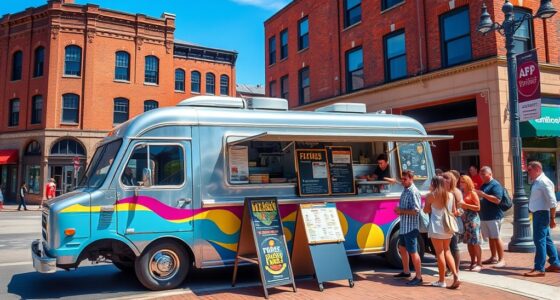To open a food truck in Las Cruces, NM, you’ll need to secure permits from the state and local health department, including registration, food safety, and vehicle permits. Expect startup costs between $50,000 and $200,000, depending on your truck’s condition and equipment. Choose busy locations like Solano Drive or local festivals for visibility. Develop a menu with authentic regional flavors and use social media and local events to attract customers. Continue exploring these steps to start your successful food truck business.
Key Takeaways
- Obtain necessary permits from the New Mexico Environment Department, register with the Secretary of State, and secure a sales tax permit.
- Startup costs range from $50,000 to over $200,000, including truck purchase, equipment, permits, and initial inventory.
- Prime locations include high-traffic streets like Solano Drive and Lohman Avenue, near events, and community hubs.
- Develop a menu focused on authentic New Mexican flavors, offering affordable items and catering to diverse dietary preferences.
- Use social media, participate in local festivals, and implement loyalty programs to increase visibility and customer engagement.
Navigating Permits and Licensing Requirements
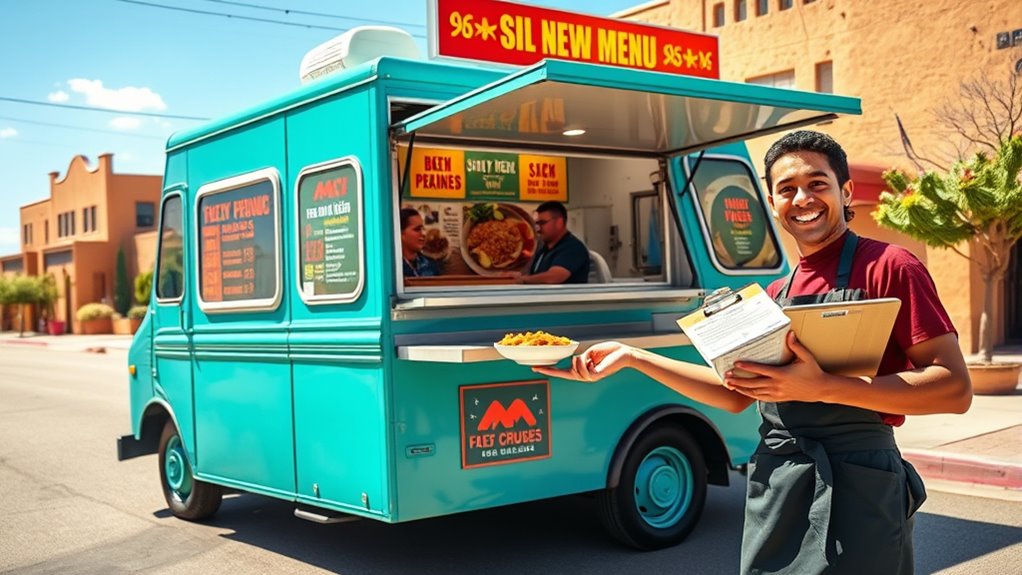
Managing permits and licensing requirements is a vital step before launching your food truck in Las Cruces. You need to register your business by obtaining a Business License from the New Mexico Secretary of State. If your truck’s trailer weighs over 2,500 pounds, you’ll pay a registration fee and provide proof of ownership, insurance, and ID. You’ll also need a Sales Tax Permit to collect and remit sales taxes legally, along with a Tax Identification Number. Local licenses may be required depending on city or county rules. For health and safety, acquire a Food Establishment Permit and Mobile Food Unit Permit from the New Mexico Environment Department, which involves passing inspections and completing food safety training. Confirm your vehicle meets safety standards and coordinate with local authorities for compliance. Obtaining these permits ensures your business operates legally and avoids potential fines or shutdowns.
Estimating Startup Expenses for Your Food Truck
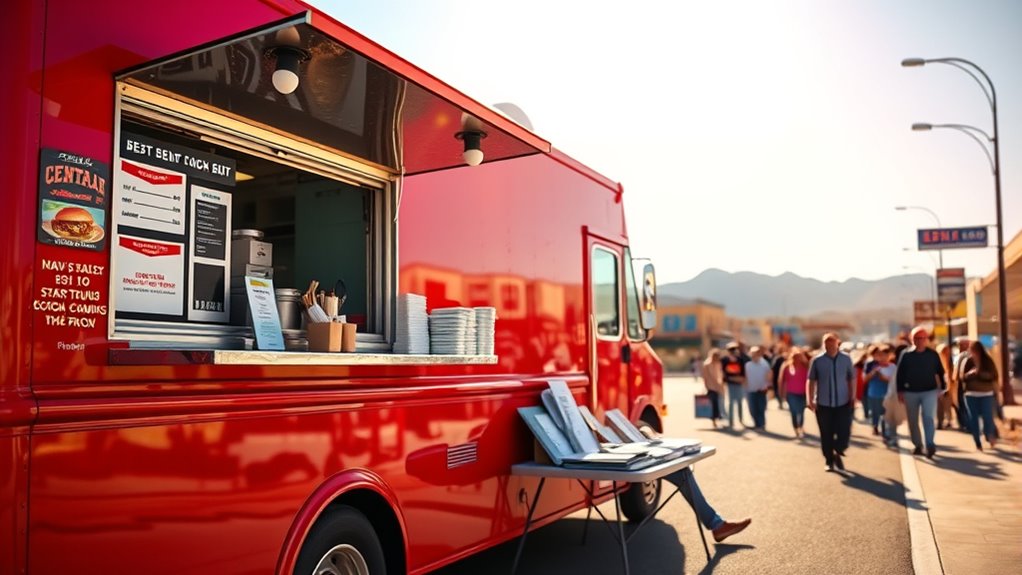
Estimating your startup expenses is a key step in launching a successful food truck operation in Las Cruces. Vehicle costs vary widely, with new trucks typically costing between $50,000 and $200,000 nationwide, while used trucks can be cheaper but may need repairs or modifications. Kitchen equipment depends on your menu and can include grills, fryers, and refrigeration, with initial inventory costs around $2,000 to $3,000. Legal costs for permits, licensing, and insurance can range from about $1,864 to over $28,000. Operating expenses such as propane, fuel, and utilities add up to thousands annually. Marketing budgets generally range from $500 to $5,000 initially, while miscellaneous costs like parking, staffing, and contingency funds should also be factored into your total startup estimate. Permits and licensing fees are essential to comply with local health and safety regulations, and their costs can vary based on specific requirements. Additionally, understanding the initial investment needed helps in creating a comprehensive financial plan for your food truck business.
Identifying Prime Locations for Your Mobile Business

Choosing the right location is crucial for your food truck’s success in Las Cruces. High-traffic streets like Solano Drive and Lohman Avenue are ideal spots, especially during evenings when rush hour boosts foot and vehicle traffic. These areas are accessible from residential and commercial zones, increasing exposure to potential customers. Nearby office districts and entertainment venues also enhance lunch and dinner crowd opportunities. Participating in community events like Food Truck Friday at Morning Star Church or local festivals can boost seasonal sales and brand visibility. Make certain your truck is parked in accessible, visible spots near traffic signals or stop signs to attract drive-by customers. Clustering with other trucks can draw more crowds, but be mindful of existing competition to find underserved areas. Researching popular event times and locations, such as farmers markets or local festivals, can further optimize your placement and maximize sales. Additionally, understanding parking regulations and permits is essential to avoid fines and ensure smooth operations.
Crafting a Menu That Appeals to Local Tastes
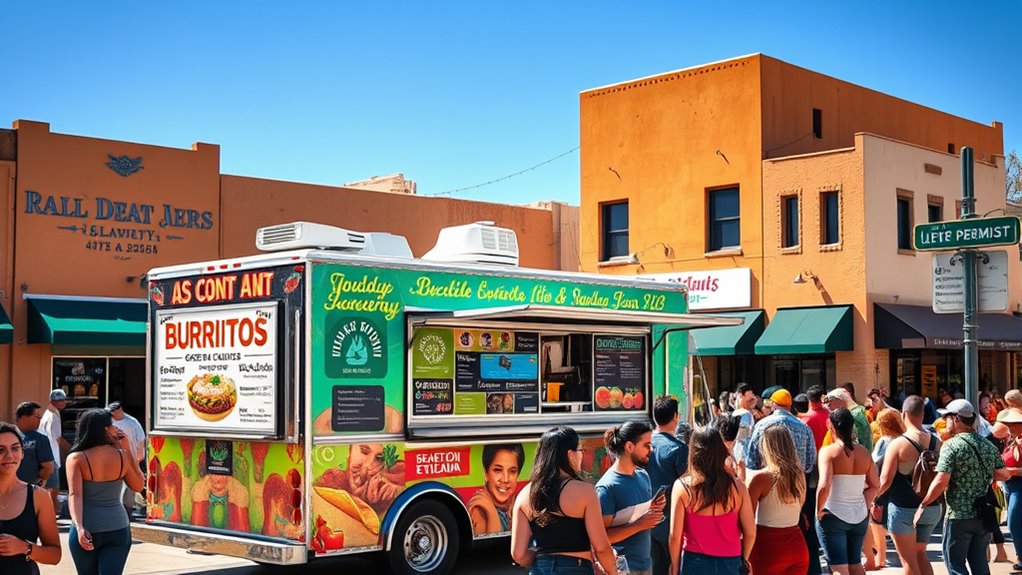
To create a menu that truly resonates with Las Cruces customers, it’s essential to incorporate local flavor preferences and regional ingredients. Focus on authentic New Mexican dishes like spicy chorizo tacos, carne fries, and Mexican street corn. Offer a mix of traditional Southwestern flavors and fusion twists to keep your menu fresh. Include vegetarian and vegan options with beans, grilled veggies, tofu, and avocado to cater to health-conscious diners. Breakfast tacos are a hit near universities, so consider adding them. Price your items affordably, around $2–$3.50 per taco, and bundle meals to boost sales. Sourcing regional produce and spices strengthens authenticity, appealing to customers seeking genuine flavors.
| Core Items | Specialty & Sides |
|---|---|
| Beef, chicken, fish tacos | Spicy chorizo tacos |
| Breakfast tacos | Chips, salsa, guacamole |
| Vegetarian options | Fresh juices, agua frescas |
| Combo meals | Local ingredients in every dish |
Effective Strategies for Marketing and Customer Engagement
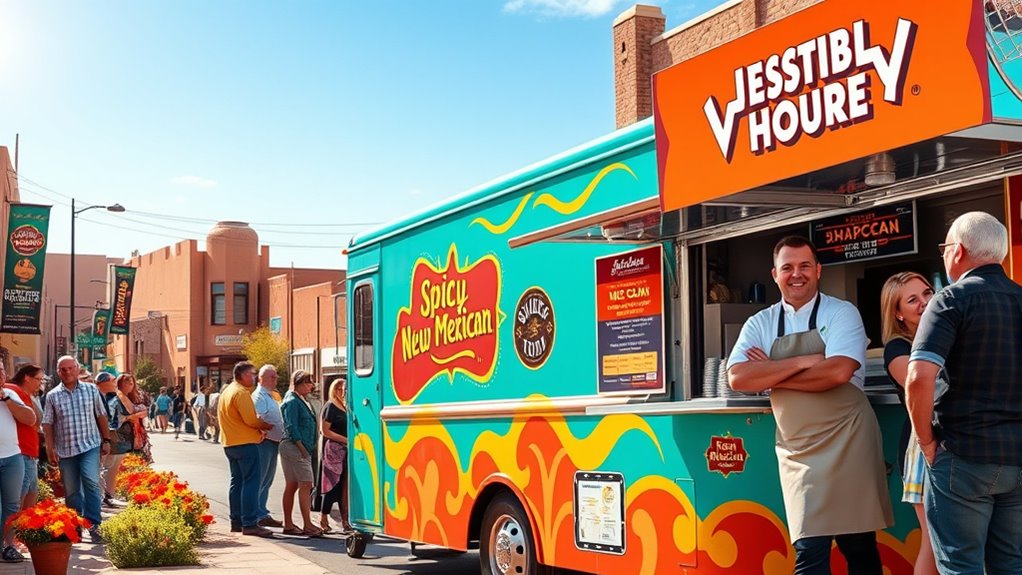
Effective marketing and customer engagement are key to building a loyal following for your food truck in Las Cruces. Leverage social media platforms like Facebook, which 75% of food trucks use actively, to boost visibility and sales. Social campaigns can increase sales by 20% and customer spend by 15%. Participating in local festivals and community events at least three times annually enhances brand recognition and allows direct interactions through sampling. Develop loyalty programs with discounts or rewards to encourage repeat visits, improving retention by 30%. Use data analytics and mobile apps to target customers effectively, increasing marketing ROI by 25%. Additionally, collaborating with influencers and utilizing short videos can create buzz. Over 50% of food trucks have implemented loyalty programs, resulting in a 30% increase in repeat visits, which further strengthens customer loyalty and engagement in your community. Incorporating colorful and eye-catching signage can also draw more attention and attract new customers. These strategies will help you connect with your audience and grow your customer base in Las Cruces.
Ensuring Compliance and Maintaining Food Safety Standards
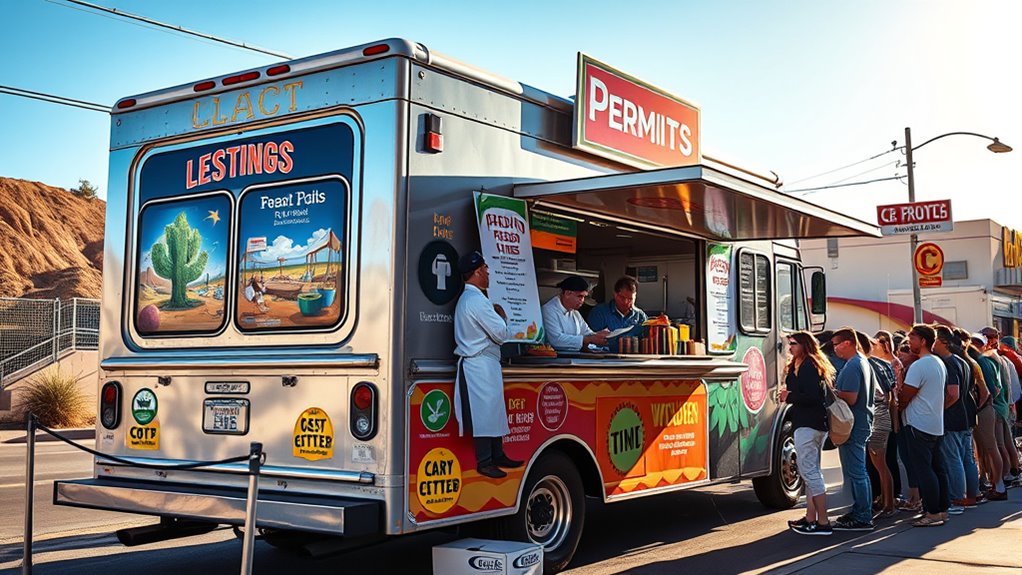
Running a successful food truck in Las Cruces means more than attracting customers; it also requires strict adherence to health regulations and food safety standards. You need to secure a food permit from the New Mexico Environment Department and obtain any necessary event permits. To stay compliant, follow the 2022 FDA Food Code, ensuring proper food handling, temperature control, and sanitation. Regular inspections verify your adherence to hygiene, storage, and waste disposal rules. Food trailers over 2,500 lbs GVWR must be registered; fee is $45/year, and maintaining documentation of your registration can help streamline inspections. Key steps include: – Training staff with ServSafe or similar certifications for food safety oversight. – Maintaining clean surfaces, proper food storage, and accessible handwashing stations. – Displaying allergen information and preventing cross-contact. Additionally, understanding food safety regulations is crucial for maintaining high standards and avoiding violations that could impact your operation.
Frequently Asked Questions
Are There Specific City or Neighborhood Restrictions for Food Truck Operation?
You need to know that Las Cruces enforces zoning restrictions limiting your food truck to certain commercial and mixed-use areas, avoiding residential zones. You must operate within designated vending zones approved by the city, adhere to parking and time limits, and follow additional restrictions from neighborhood associations. Violating these rules can lead to fines or shutdowns. Always check local permits and community guidelines to guarantee you’re compliant and avoid issues.
How Do Weather Conditions Impact Food Truck Business Planning in Las Cruces?
Ever wondered how weather shapes your food truck business? In Las Cruces, scorching summers mean you must plan for heat management, like installing cooling systems and choosing shaded spots. Adjust your hours to avoid peak heat and offer lighter, invigorating menu options. Seasonal rains and milder winters also influence your schedule and location choices. Flexibility and weather-ready equipment become key to keeping your operation smooth and customer-friendly year-round.
What Are the Best Practices for Parking and Securing Permits at Special Events?
You should identify designated parking areas provided by event organizers to stay compliant and guarantee safety. Reserve your spot early, display permits clearly, and confirm access to utilities like water and power. Follow all safety regulations, including health, fire, and sanitation standards. Engaging with organizers for promotion and securing necessary permits ahead of time helps you avoid penalties and maximizes your visibility at the event.
How Can I Effectively Train Staff on Local Food Safety Regulations?
Training your staff on local food safety regulations is like building a sturdy foundation for a house. You should start with clear, hands-on demonstrations of safe practices, using official resources from New Mexico agencies. Regularly quiz and refresh their knowledge, keep detailed records, and assign supervisors to enforce standards daily. Encourage open communication so staff feel comfortable reporting concerns, ensuring everyone stays compliant and your operation runs smoothly.
What Are the Common Challenges Faced by New Food Truck Owners in Las Cruces?
You’ll face challenges like maneuvering complex licensing and permit processes, which can be time-consuming and costly. Securing prime locations is tough due to competition and restrictions, while limited space inside the truck hampers menu variety and efficiency. Managing ongoing expenses like fuel and maintenance adds financial pressure. Additionally, differentiating your offerings and building a loyal customer base require continuous innovation and strategic marketing to stay competitive in Las Cruces.
Conclusion
Starting your food truck in Las Cruces is like planting a seed—you’ll need the right permits, a tasty menu, and smart marketing to help it grow. Keep costs in check, choose busy locations, and prioritize safety to build a loyal customer base. With dedication and a bit of creativity, your mobile business can thrive like a desert bloom—vibrant and unstoppable. Get ready to turn your food truck dream into a delicious reality!
